#Retelling
Explore tagged Tumblr posts
Text
The Three Brothers and the Division of the Realms
After the battle, the three brothers decide how to split their domains: Zeus gets the skies (and the role of King of the Gods), Poseidon gets the seas, the land, and horses (sorry, I know that's not quite accurate, but it cracked me up), and Hades gets the Underworld.

Just know that I have no idea if I'll ever draw the Titanomachy — I'd love to, who knows — but in my headcanon, Zeus saves Poseidon first because he initially mistakes him for a woman. And honestly, I should draw it just for that scene.
#poseidon#jellyseidon#hades#Zeus#titanomachy#comic#silly comic#siblings#olympian gods#retelling#greek mythology#epic the musical
627 notes
·
View notes
Text
Due to AO3 being maintained, I'm posting the first little bit of, what could be, the silliest thing I've ever written. The working title is 'Beauty and the Steve'.
Eddie does his best to dodge the morning traffic.
That crazy lady’s chickens are loose again, and it’s creating a minor amount of havoc. The baker always goes out of his way to say good morning to Eddie, and, when him and uncle Wayne had first moved to the little village of Hawkins, Eddie was sure he was just being polite.
Now Eddie thinks he may be a bit of an old lech. It’s no secret Eddie is the only male Omega in the village, but at least he isn’t completely alone. There’s three female Omega too; identical triplets though, which is just fucking weird in Eddie’s book. He’s sure that’s got to be somebody’s kink, right?
“Eddie, where are you off to in such a hurry?” The baker calls out of the window, and Eddie can clearly see his irritated mate behind him. She looks like she’s gearing up to skewer the guy with a baguette.
“Oh, just the bookshop!” And Eddie waves, trying to indicate politely that he’s done with this, slipping away in a confusion of chickens.
Eddie turns the corner, only to find his way blocked by a hay wagon, “good morning!”
“Errr…” Eddie, not for the first time, internally curses small villages, “morning, are you, uhm, moving?”
“Just getting ready to unload, won’t be long!” The man calls down cheerfully. Eddie eyes the bales, contemplates going back the way he has come, but he spies the bakers wife hitting the baker with a loaf, surrounded by chickens who appear to be excited by the prospect of violently created breadcrumbs.
Eddie climbs over the wagon.
Eddie makes it to the door of the bookshop, pulling hay out of his curls, cursing villages, narrow cobbled streets, the people who inhabit them, and the countryside in general.
“Ah! Eddie!” Owens calls out. He’s the old dude who owns the bookshop, the only shred of civilization that exists for at least, Eddie suspects, five days ride in any direction.
“Good morning! I've come to return the book I borrowed.”
Owens takes the book, “finished already?” he returns it easily to it’s place on the shelves.
“Oh, I couldn't put it down!” Eddie replies keenly, and he means it. He literally did not put it down because there's absolutely nothing else to do now that he's stuck living in the middle of nowhere. “Have you got anything new?”
Owens laughs good naturedly, “not since yesterday Eddie.”
“That’s alright,” Eddie assures him, because Eddie already knows exactly which book he wants to read again, and he knows exactly where it is, he takes a few steps up the ladder to retrieve it, “I’ll borrow...this one.”
“That one? But you've read it twice!”
“Well it's my favorite!” Eddie locks his boots either side of the ladder, sliding down the ladder, hopping off the last step, “far off places, daring sword fights, magic spells, and an Alpha prince in disguise!”
“Well, if you like it all that much, it's yours!” Owen’s tells him kindly.
“But sir!” Eddie starts to protest. He knows people are soft on him sometimes because of his designation. And the whole being an orphan thing, which, thanks to village gossip, spread like wildfire when he and uncle Wayne moved here, just the two of them. Eddie hates charity...but he really does love this book.
“I insist!”
“Well thank you...Thank you very much!” And Eddie is being sent out of the bookshop and into the sunshine. He’s pretty certain Owens doesn’t know how book shops are even supposed to work, considering he keeps letting Eddie borrow them – and now he’s even giving them away. Regardless, Eddie really shouldn’t look a gift horse in the mouth.
#eddie munson#steve harrington#stranger things#steddie#beauty and the beast#retelling#alpha steve harrington#omega eddie munson because he's so pretty
157 notes
·
View notes
Text
Red drops fell onto the frozen earth. Dripping off the knuckles of Demeter’s shaking fist, the pomegranate crushed between her fingers.
"You tricked her." Her voice was barely a breath, but it was in every howling gale sobbing in the barren trees.
Hades, lovesick, pained yet unrepentant, met her eyes without a word.
"So be it." The parched ground groaned under Demeter's feet, but she did not hear it, her eyes fixed on Hades' stoic face. "You took my child from me, then take all to keep her company. I shall not nurture earth she does not walk upon."
For the first time, Hades started back, but Demeter was turneding away from him already, casting her sunken eyes to the heavens.
"I will be deaf to their pleas, like you were to mine!" her voice screeched, and breaking, shuddered on: "And there won’t be a parent among them, even as they curse my name, who can swear they would not have done the same..."
Silence fell. And the wilting earth wept. Until a voice came from the dark like a song and Hermes, swift-footed, emerged from the mouth of Hades.
"Six seeds, dear uncle, sweet aunt of mine. Only six out of a whole fruit..."
His smile was winning, but his cunning eyes were wide. As wide as the as the vast fields, ploughed to breaking in human desperation, that stretched lifeless past every horizon.
"Six seeds...six months..." He looked from the lord of the dead to the mistress of the harvest. "Six months above, with her loving mother, six months below, with her faithful husband."
The very breeze held its breath as hope and fury mingled in Demeter's eyes and Hermes bowed, his knuckles pale around his winged staff.
Hades stood, silent, and then quickly stepped, allowing Hermes to pass. And behind him, led up the endless steps of Hades, came Persephone. Dressed in rayments as fine and dark as the night.
"Mother!"
It was a commonplace cry. Cried by every fledgling tumbled from the nest, every cub turned around in the woods, every child lost in the dark. But the whole world breathed as Demeter answered.
Hades averted his eyes, Hermes grinned at the sky, and holding her daughter once more, tears finally welled in Demeter's frozen eyes. Raining down upon the earth, where grass began sprouting between Persephone's feet.
#merry autumn equinox!#greek mythology#hymn to demeter#retelling#reimagining#laura drabbles#hades and persephone#demeter#persephone#hades#hermes#zeus isn't here but he's listening#greek gods#greek myth
343 notes
·
View notes
Text
Demeter's Walking Days
Demeter sits in the ruins of herself, legs buckled, head bent low as if for executioner's blade. The earth gapes and it is a wound that should have bled. The crack in the soft soil should have wept ash and billowed smog, choking rivers and blotting out sun. Hecate, who stands between heaven and earth and does not balk, points. She need not. Her daughter’s last cry splinters through Demeter’s head, mind’s eye summoning all.
The thunder crack of hooves and eyes widening in fear. The other daughters bolting, skinny legs flashing and soles of their feet licking the earth. Flowers scattered. Golden tuft of hair disappearing beneath. Daylight bleaching over emptied fields and ravished earth.
Demeter wraps her arms around her belly and lets out a low braying moan. A breeze rustles the tall grasses, and the sun warms her cheeks. “Why?” she rasps. Unfairness is an eating thing, drilling down, down, down into the soft meat of the body.
“Why?” Tears stain Demeter’s cheeks and the crack in the earth remains dull and quiet. Salt wets her lips and the feelings stretch into an unbroken ocean. Oh, but she knew why. She could hear his voice before she even stepped foot into the court of the gods. Before she went to beg.
Because she was beautiful, her brother says, echoing forward and back, because she was there.
Demeter swallows her heart hand over fist, swallowing and swallowing. She stands.
-------------------
Before Demeter walks the earth under barren days. Before the rivers splinter white. Before the soil hardens, unsoft enough for even corpses–why should they get to bury their sons and daughters when she would not? She makes her petition.
“You know our brother,” Zeus addresses the air above her head and all who could listen, “a King in his own right and the only one of our thrones without a bride.” Zeus gives a wry little smile that lights the clouds. Deep and sonorous, his chuckle shakes through her ankle bones. “He’s complained enough, don’t you think? He has to be alone with his gruesome little kingdom while the rest of us fritter about.”
Demeter holds herself perfectly still and the court drones around her. “I did not know.”
“No, no, it was I who promised her,” the father says, despite how little that word meant. “We are lucky to have created such a beautiful daughter.”
“I am her mother.”–how little that word meant as well–“She is only a child.”
He rubs his whiskered face with one hand. “Is this not how girls become women?”
Demeter swallows. “My daughter, she will wither. No sunlight, no fields, no love. You, all of you, you know her. She’ll waste into a shadow of herself.” Silence spread like infection. Demeter’s voice rose, frantic. “She’s not eaten yet, I’m sure! Please, let me go to her, see her, kiss her tender cheek and stroke her hair–”
“You know as well as I there are far worse husbands than rich and patient Hades,” Zeus rumbles through his mighty chest. “Dear heart, you must have known you couldn’t hold onto her forever. You’re wiser than that.”
Demeter clenches her jaw and the Goddess of marriage, who hates her so, speaks.
“She’ll make a fine bride.” Hera’s voice is smooth and melodic. “And will learn to make her bed where she finds it.”
Demeter’s gaze cuts across the throne room. “How do you know?”
Hera scoffs. “Don’t be naive.”
Demeter looks between their divine figures. The flame in her belly burns low, growing with every breath. Golden head dipped into the dark. Scattered flowers. Voice swallowed. Demeter’s long hair falls around her face. “I can’t allow it.”
“What does that mean?” the Messenger asks, not unkindly.
“You have misplaced your loyalties,” Zeus says, still laughing, tall above the clouds.
“You’ve misplaced your sense of ownership,” Hera tuts. “How many go to Hades willingly?”
Demeter snarls for the first time. “Not my daughter.”
Hera, cruelly, hating them all, laughs. Her lips curl back. “Yes. Her.”
“Hush! This is Hades. Hades!” Zeus raises his voice. “She’ll be taken care of.”
Demeter sets her jaw. “She was crying out for me.”
“Dear heart, I understand you must be feeling lonely now . . .”
The rushing in her ears replaces all murmurs of court. Demeter focuses on Zeus and Zeus alone. He, who loves the mortals more. “If you do this, if you won’t give her back,” Demeter gnashes her teeth, “I will take what you care about in turn.”
They protest. They call out her name. They offer her comforts and consolations and promises. The drumbeat in her ears drowns out all sound. Demeter puts down her sickle.
---------------
The nymph's howl in one voice, their rivers menaced to a standstill and trees unclothed piece by piece. The crunch of leaves as the crunch of bone under Demeter’s step. Helios grows dim. He, who watched fair Persephone gathering flowers and witnessed the silent one pilfer her away, did nothing. And he knew, even more so, Demeter carries a double-headed axe.
Snow falls like shooting stars bent for dying and the clouds transform the land into themselves, harvest buried and buried and buried again. Sunken eyes and wizened bodies. Hands dyed blue and given to tremors.
At first, they try to appease their hollow bellies. Wine into the fire. Slaves at the altar. Blood and beast and prayer. Demeter is not listening. Not to the people, crying out, and nymphs sobbing at the roots of their trees.
One by one, by hearth and forge and stone, they ask her to lift the curse. Could she not hear them in her own fields? It was not they that stole the girl. Did she not have her own divine purpose? And had she not known? Her daughter was beautiful after all, and she was there.
Hermes comes on lighted step, and begs her last of all.
“She’s already gone. Let her go,” he says, not unkindly.
“I did not know,” Demeter answers.
“You misuse your purpose.”
“If my daughter must live in lands of gloom and death, then so must all.”
“Let her go,” the people cry. “Where does this end?”
“I will freeze the world over,” answers Demeter. Hermes leaves to find a different, more listening ear.
---------------
Demeter strokes her tender face and kisses her lovely cheeks. She is taller, heavier, more womanly. Persephone weeps in her mother’s arms. She hadn’t meant to eat. She clings to her mother’s skirts. She hadn’t meant for any of it.
“I know, I know.” Demeter rubs her daughter’s back and bursts with it—alive and breathing, this girl of hers.
“I’m sorry mother.”
“It was not you.”
Persephone wipes her damp cheeks. “You sent so many down to us . . .”
Demeter sets her jaw. “It was not you.”
After Demeter carries her daughter home and sets the sun to rights. After she beds down the frost and unbreaks the rivers, teaches buds to push and birds to roost home, they do not speak of the six seeds. The half a year of hunger—that damnation of Persephone. The girl and the mother embrace as if not but a day has passed instead of the invention of ugly hurting mourning.
“Did he honor you?” Demeter deigns to ask.
She buries her face in her arms. “He will make a godly husband.”
“Does he treat you well?”
“There are worse ones. Far worse.”
“Did you ask to return to me?”
Persephone rises and blinks the tears from her eyes. “Of course. Of course, mother. I would not stay. I,” she swallows, “I love you so.”
“And he?” Demeter asks, petting her hair. Persephone opens and closes her mouth as if drowning. “Could you love him?”
Persephone wipes her cheeks with the meat of her palm. The question collapses around itself. Persephone cannot answer and year after year, she never can, and Demeter forgoes herself for the robes of despair.
---------------
How many times? How many lives lived? In Demeter’s walking days, she goes to the mouth of a cave. Black birds peck at the ground, eyes like liquid ink, and warm air leaks from the earth. A man sits, slumped inside, shrouded. He watches waves crash against a gray shoreline.
The crows peck at the ends of Demeter’s cloak—a trailing gown always scattering the tender seeds of next year. She has already begun to forget.
“You. You came back once,” she says through the fog of her own memory. The man’s lips pull apart like an opening wound.
“He is aware.” He has a warm voice, too big for his large body.
“You know the way. You’ve walked the path.”
His eyes glint from under his hood, bright as tiny suns, too sad for such a large life. “It’s not for you,” says the hero, shooing away crows. “What use would the deathless ones have for such a path?”
“He takes her,” she mumbles.
“What did you expect?”
Demeter’s hand clenches around her golden axe. “Step aside. I’ll visit him myself. At last.”
“The Hospitable One has no fight with you, lady,” he wheezes and gathers the shroud around his bulk.
“He will.”
“He is a fair lord.”
“Does a fair man need a strong grip and a chariot?” Demeter let her chin fall to her chest.
“You would have never let her go.”
“She was a child.” Demeter’s gaze unfocuses, remembering and forgetting. Her own failure sours on her tongue. “She was crying out for me.”
The hero shrugs his vast shoulders. “She’s not the only one—just the one that gets to come back. Is that not enough?”
“No.” Demeter passes the ghost, strayed far from his home and given the leeway of heroes of old or a man so full of life it buoyed him above. She side-steps the phantom and his gaze returns to the sea. She goes to the crack in the earth.
Gloom thick as cobwebs covers the way. Demeter steps into the dark and the dark pushes back. She grits her teeth, and it clings to her, tugs like thorns, pushes back and back until her skin stretches like long rays of sun. But she is a goddess. The sun burns at her back and the crows peck at her cloak. She forces her way through, leaving hair and cloth and flesh behind. Golden ichor trails after her in the dark.
The road narrows and stones pierce the soles of Demeter’s feet through her fine shoes. Muffled voices whisper at the edges of the dark. Fog gathers along the path, ghastly and unlit and forever narrowing. Demeter walks until her head pounds and the way forks—one into the caves and the other into ever-distant black hills.
Ahead, always ahead, a figure turns and pulls down her hood. Her face is the color of bony moonlight, and she wears her crown of thorny branches. A dog bays at her heels and at the crossroads, she holds up her lantern.
“I heard you might be wandering. Do you know where you are?” Hecate goes to Demeter, pushing back Demeter’s tangled hair and rubbing her bare shoulder. “You don’t belong here.”
“I can hear her.” Demeter looks everywhere the girl is not. Voice swallowed. Flowers scattered. Demeter gnashes her teeth. Because she was beautiful. “I can hear him.”
Hecate gentles her. “You can’t be here.”
“But I am.”
“It will cost you. Keep costing.”
Demeter laughs, a throaty sound of puking dogs. “Pay me then. Bribe me. Make me an offer of something worth having that I don’t already make.”
“Have you forgotten? She’ll return to you. Have patience.”
Demeter shakes her head over and over again. Her voice is diminished in the cold and the black and the blood leaks freely from her ankles. “You too?”
She kisses her cheek. “I heard you were wandering.”
A goddess of magic and doorways, Hecate takes her by the hand and turns Demeter. Her shivering is violent, violent enough to come apart, and Hecate’s grip is firm. They walk. There is slim light ahead and the ghosts are murmuring, forgetting more than they will ever remember. The goddesses take the higher path, hand and hand, and the fire drains from Demeter’s belly.
She holds her pounding head. “He’s here, isn’t he? He sent you.”
Hecate rubs her shoulder. “Knowing will not soothe you.”
“Or worse.” Demeter pulls away. “He thinks me impotent.”
“He thinks you lost. They all do.”
Demeter’s eyes flash in the dark. “And you? Hecate.”
Hecate peers over one shoulder and then the other. Her dog sniffs the air. The way is much as it was, dank and unlit and forever narrowing. The other goddess presses a cold metal ball into Demeter’s palm and folds her fingers around it one by one. She whispers an old woman’s whisper, gossip from the funeral pyre. “It can take generations.”
Demeter nods. She clenches her fist around the blunt metal. They walk and the dark shifts from inky blacks to browns to greys. A sliver of brightness breaches the wall, and Demeter jerks her fist up.
“Wait,” Hecate hisses but Demeter goes to the light.
She holds up her gift to the crack and squints. A silver whistle the size of her thumb twinkles between her fingertips. An etching of a wheel is pressed into the belly and time leaks out from inside, the tug of the fates.
She brings the whistle to her lips.
Hecate puts a hand up. “You don’t have to–”
No sound comes out. The ball is missing from inside and Demeter’s eyes water. She breaks from Hecate and runs from the road of the dead, dripping ichor, cursing the games they play. The earth gives her up, splitting like ripe fruit, and Demeter is pushed into a field of sunlight and frost. Her daughter is not there. And she breaks the world.
---------------
She forgets, in her walking days, and the same months play out in the rise and fall of lungs. The light will die along with Demeter’s hope and the gods will turn away. Demeter stalks the land, torch in hand, looking for the girl they cannot save and she will not let go. Remembering is for the muses and the bards and when Demeter runs into a group of mortals, they cower back, and she tilts her head.
“Where are you going, mother?” asks the bravest one, shivering.
Demeter searches her person. “Here,” she says and to her surprise, holds up a silver whistle. It is only in the pale light of the moon that she recognizes how the mortals huddle together with their bags bulging. They are fleeing something, she thinks, and they point her to the mountain. She thanks them in kind.
Between the naked trunks, a set of tracks is stitched into the land. Beams of steel and wood form a single unerring road. She would love that, wouldn’t she? The thought pushes Demeter to move. Iron spikes pierce the soil, and the wooden beams form a path that does not curve. Demeter follows the unbroken way, clutching the whistle, and listening. Smoke billows in the distance and a whistle like a hunting horn, leading her further into the night.
Glimmering like a fish scale in the water, a station waits on the side of the tracks. The building lies in the deep shadow of a mountain and windows glow faintly blue against the dark. A wheel is carved above the doorway and a large clock ticks from inside. Mortals and gods cover their faces and bustle in and out of the front door.
The night is still and unwatched. Demeter tilts her head back, inhales the frigid air that hits like puncture wounds, and climbs the steps. Passing mortals study her face and hurry in the other direction. The minor gods give her a wide berth and take their leave a few steps after. The station at the edge of the track empties.
A large desk takes up the middle of a room caged by bookcases and filing cabinets. An old god sits, rarely alone, always forgoing rest and carrying on. Her head bows beneath the clock and a train conductor’s whistle hangs from her neck. The scratch of pen against paper fills the room and they are alone.
Demeter tosses the whistle down at Nemesis’s feet. Nemesis frowns, a private motion, and raises her head. She wears a conductor's hat and holds a new kind of pen and new kind of parchment, like many times before, Demeter finds her silly. She has little appreciation for the other side of memory, the continuing. A goddess stuck in her own gyres staring down a goddess wearing man’s hat and man’s jacket and man’s unending problems.
Nemesis opens her ledger and trails her finger down a list of the dead propped up against a ledger of deeds. She glances up, eyes like silver coins at the bottom of a well. She clears her throat.
“You aren’t here for me, are you?” Her tone is clipped, professional.
Demeter opens her arms, mourning shrouds spread like wings. “Has it been long enough?” Nemesis narrows her gaze. “How much longer must I wait for your services?”
Nemesis folds her hands. “I don’t set the terms.”
Demeter darkens, rising to her full height above the smaller goddess. “You don’t know what I’ve been through.”
“I do. Spare my house your cold fronts,” Nemesis says, who was born immune to grief. “I am a busy woman.”
“We have much in common.” Demeter takes a seat across from her.
Nemesis scribbles calculations on the side of her ledger. “What punishment would you see fit for the lord of the dead? We can send him more subjects he takes little joy from. Deprive him of wealth he has little to do with.”
“Fair Hades, generous Hades.” Demeter’s lips peel back. “They have been charitable. Granted him room enough to fall.”
Nemesis snaps her book shut. “Be at peace, goddess. You forget your daughter will return soon.”
“That’s all you have to say? Betrayal and violation and the goddess of vengeance—”
“You have been injured.” Nemesis stands and a train shouts in the distance, a long baleful cry. “You carried out your own justice.”
“You are not my brother’s creature.” She exhales a long breath. “You need not be.”
Nemesis looks out the window to the shadow of the mountain. “I am a busy woman.”
“Here. An offering.” Demeter reaches into her pockets. “For your books.” She scatters hay seeds and wheat stalks and bits of golden pods. They clatter in waves across the open pages, landing on the scrawls of her endless notes.
Nemesis’s eyes glint, cold and implacable. A bird crows and Demeter gives a small smile. They’ll come soon, harvest always does, to pull apart the worms and seeds and work of yesteryear. To undo the seams of books and words and let the eating begin. A new world still bends to the rules of the old.
“He is not here,” Demeter whispers furtively and Nemesis sighs. She pushes herself away from the desk.
“Stand.” Nemesis, who was born immune to grief and carries on, rises. “Walk.” Nemesis, without looking back, leads her through the stacks. They pass the mountain outside. Behind the many cases, is a tucked-away door, boxy and dark and opening inward. Demeter has to duck her head to enter.
The furniture within is covered in sheets and surrounded by stacks of scrolls, weaponry, and animal pelts. Demeter sniffs the air, and the dust is thick and generational. She steps to the side and Nemesis goes to her knees.
A train whistle sounds once more and Demeter’s heart thrums. She feels a foreign thrill and pumps her hand in the air. “We’ll master the first injustice.”
“Hardly!” Nemesis throws her arms up in turn. The room is lit by scattered brass lamps, a bridle on the wall, and sword on the floor and the scraps of good bedding in the corner. Demeter privately thinks it sad. Nemesis rifles through her piles.
“We might slay him,” Demeter offers, eyeing the sword.
“Yes. Your daughter will make a perfect sole hostess of the dead, solitary lord of all she touches and rich beyond means.” Demeter frowns and rocks on her heels. Nemesis lets out a tiny laugh. “You cannot undo it.”
She adjusts her mourning cloak. “You’re wrong.”
“I have heard that before.” She laughs again.
“You’re wrong,” she repeats, louder, and Demeter adjusts her sleeves. “She’ll go where she pleases at the very least. She can grant herself that.”
“Will she come back to you then, my lady? Is that where she’s going?” Nemesis pauses. “Do you know where this leads?”
She begins to fold Nemesis’s stray bedding. “I do remember. I have taken . . . steps.” Nemesis nods, shifting a scale aside and digging up molded books. “I have not been idle over these long years. Grown food more richly than ever before, more of it, hardier. Would that not be fit for a dream? To tempt him. Tempt her with fruits rich enough to topple the halls of gloom.”
Nemesis shakes her head. “Sounds like you have little use for me.”
Demeter wrinkles her nose. “You see better than me. Then almost all of us.”
“Flattery will not change my nature nor make it true.” Nemesis dusts off a box no bigger than a hare and lifts it high. She turns over a box of metal and wires, over and over in her hands.
“They made this. It won’t turn things back but may make a difference.” She holds it out, and the same sense rushes from inside: fate, blowing her cool breath.
Demeter finishes making the bed and turns in a circle. “Have you eaten?” she asks all at once.
Nemesis blinks and looks at the window, the mountain, and back. Demeter turns on her heels and waves. “Come. Before the sun rises.”
Nemesis carries her metal box to the other room. The kitchen is smaller than the bedroom and poorly stocked, but Demeter works her small miracle. Bread and wine and grapes. They dine and talk and have little use for past feuds as they are old goddesses and know how to carry on. The wine is good, and time is late.
Nemesis only offers again, once, only once, her box of metal and wires, of lightning and glass and mortals. Demeter stands, paces, and faces the door. The other goddess checks her watch. “You are the one that came to me, mistress.”
Demeter stares down at her own hands, her feet, over her shoulder, awash in bile in the back of her throat. “Would you also have me let this go? You. Of all of them.”
Nemesis folds her hands in her lap, never hurried, never squeamish about the ugliness or beauty in a heart. She waits.
“What do you want me to say?”
“Say,” Demeter swallows around the fist in her throat. “Say I’m like them, like any of them. Say you’ll have me too.”
Nemesis crosses the room, a head shorter than the Lady of the Golden Blade, and darker. “You were wronged.” The Implacable one lifts herself up. Her hat crooks backward and her breath smells of cold iron and rain. “Perhaps it is too early. But what is early to you? Here. Take it.”
Nemesis kisses the Mistress, hard on the lips and Demeter breathes in what there is to take. She cradles her small frame and pushes her down to the sad bedding newly made. A small goddess, always carrying on, and another filled with need that towers over cities and topples over fields. Demeter begins anew.
---------------
They cannot say why Demeter walks or why she wakes, and the years spill past. On one twilight, Demeter’s feet carry her over ravished lands. The fields are caked in frost and frozen blood and small metal apples that are prone to burning. She passes a city opened like a ribcage, and an orchard she once knew.
Hot cider, she thinks in her own deadness, hot cider for the long night. There is a low brown building among the rubble and a note of perfume in the air. She follows the scent all the way to the door. The men inside are not soldiers, leftover grandfathers and teens with bum knees and cowards with better lies, all greet her as fellows.
“Good evening, Mother,” says a man with his jacket undone. “They have taken the last of the meat, but the drinks are strong, and we have a good lady upstairs. Come, get warm.”
Demeter nods at the drunk men, far too many, stuffed into this tiny post office. They cheer and watch the skies, singing about morning—and who knew what morning meant! The space is dim and the perfume strong and Demeter climbs the stairs away from the men’s unwatchable merriment.
A woman lounges on top of a stack of burlap sacks. She is resplendent in nurse’s white; and wears her hair loose and long. Aphrodite is in her prime, reclining as only a goddess can, and flips through crusting yellow letters. She beams at Demeter.
“Look at you, lone little dove!” Aphrodite cries and sets down the letter. “What a pleasure it is for you to stop by.”
Demeter furrows her brow, jostled from the depths of herself. “Are you occupied?” Her mind sparks. Buildings smolder outside, the trees blackened, and skies red. Demeter takes a step back, looking above and below. “Are we alone here? Is he coming?”
“You’re safe with me.” Aphrodite’s smile stretches wide. “You know, the others speak so ill of you when you’re in this way. They have no imaginations. I like you better in your blacks.”
Demeter stalks the edge of the burlap sacks. “I cannot say I like you better in pinks or whites, good lady.”
“See? Delightful.” She smiles even wider into something painful looking.
Demeter goes to the window and inhales.
“Do you know where we are?” Aphrodite asks, kicking her feet up.
“They used to grow apples here,” Demeter murmurs, running a hand down her long face. “You forget what they can do to themselves.”
“Must we talk of work? Tell me of your new lovers.” Aphrodite tosses her thick hair aside and squeals. Demeter needn’t answer. “You’re so predictable, really! The little grim goddess. But that's why I like this version of you best.”
“You shouldn’t.” The men howl a song from down below. Demeter presents her own dim smile. “But maybe you’re predictable too. Is he really not here?”
Aphrodite’s smile falters and she smooths out the note in her hand. “Aren’t they all? My husband is even in the skies if you listen.”
Demeter hums in return. All here. . . She takes out a little box given to her by the vengeance goddess.
“Do you know this?”
“Oh! Do I know it!” Aphrodite scrambles down from her perch. “I love it. I adore it. I am on fire just thinking of it. They invented it for me if you think about it.” She takes the device in her hand and turns it over and over.
“Help me,” Demeter begs, only just. “I do not know how I’ll ever be whole again, you must know.”
Aphrodite smiles, warmly, manic light in her eyes. “You are a testament to the best of us. Come. Let us kiss and make merry. We can invite the little goddess too, if you like, however dull she is. Or any of them, Themis, Dike, if you care for the likes of whatever justice gods come next.”
Demeter, for not the first time, and as much as she can bear it, stares out the window. “I do not think they are awake. Only you and War may even survive such a long night.”
“You are so dramatic in your walking days, kiss me, kiss me next and let winter end or last forever this time.”
Demeter shook her head. “How do I work this? Nemesis said I might.”
“Nemesis is quite busy right now. Quiet busy when she isn’t being devoured for it. Are you really still looking for this girl of yours? So single-minded. Don’t you know there’s a war on?”
Demeter meets her gaze. “Don’t you?”
“I know better than anyone,” says the goddess in her prime. “I am needed.”
Demeter snorts at that and Aphrodite scowls, both thinking the same thought: the mortals could live without the other, but not without her. Aphrodite relents when the sun begins to set, so early, so soon, and she must slip out the back. Aphrodite holds up the camera.
“Click, click,” she says, a bit like a child and Demeter loves her for it. She shows her how to aim the lens and press the button down. “That’s all, click, click. You’ll see.”
Demeter cradles the camera, and she must walk, and the skies must burn, and Aphrodite must slip out the back, carrying several letters with her. Letters that maybe, just maybe, will be delivered. Aren’t the dates off? they ask, nothing else made it out. Oh, but the mail system is unpredictable. These last ones must have made it out. Don’t think too hard, they must all carry on.
---------------
A young mortal man meets a mother and daughter. They live in a farmhouse that spans a small neighborhood. Endless parlors and bedrooms and closets, and the two seem to occupy two rooms—living room to kitchen to living room and back again. His lover does not bother to knock and hurries them to the living space. The walls are painted yellow as dawn and the carpets are a thick cream color. A girl lounges on the couch. She wears a tank top, blonde hair piled on her head, and phone on her lap. The young man wonders what she could possibly be looking at.
“Hello, dear!” His lover strides forward. Nicholas gives a weak wave from behind. “Good to see you again.”
The girl looks up from her phone. Her expression is endlessly blank, and Nicholas must shrink down to the size of two pins. They had met before, back when he was touring and being shown off as a prize and he would like to say he hated it. The girl sticks out her bottom lip.
“Mom!” Persephone’s voice splits the air. “Your appointment is here. He brought a guest.”
“Does she know me?” Nicholas mumbles to his lover and Apollo squeezes his shoulder.
“It’s been a season,” Apollo says in answer. “I’ll be right back, love. Won’t be a moment once I finish up.”
Which is a lie because his lover is never done. He leaves him. Nicholas goes to the edge of the room, eyeing the golden-haired, golden-eyed girl. He had been surprised at her features when they first met, rough-hewn, prominent, clifflike cheeks and sturdy nose, beautiful and strange. Her eyes are the most unnerving part. Their golden color feels natural, yet they are so deep-set in her face to the point of shadow. Most of all, she is young, and younger when she looks up.
“Mom!” she shouts again. “The guest.”
“Send him to the kitchen, dear!” a matronly voice calls, and Persephone groans and throws her head back, ponytail flopping.
“It’s your house. He’s your guest!” She lurches to her feet in the same breath.
Nicholas puts his hands up, face heating. “It’s fine, really. No need to get up. We’ll only be stopping by a moment,” he says, though he knows he’s lying.
“Come on.”
The little goddess takes him to the kitchen and fills up a tall glass of water.
“Here,” she says, and he has to stop himself from staring.
“Thanks,” he says, holding the glass but not taking a sip. “Do you two live alone?”
Persephone raises an eyebrow, stuffing both hands under her arms. “The farm hands . . .” she mumbles and turns away from him. “But we’re not here year round. Mom can’t stand an empty house.”
Her golden eyes blaze against his cheeks and Nicholas realizes too late, she’s expecting conversation.
“Mine too,” he says, chuckling awkwardly. “My mom’s an empty nester and she says she can’t bring herself to turn my room into a home gym even though I’ve been touring for like, what? Almost a decade now.”
He has no idea if this makes sense to her. He’s met Persephone before, but she was different then, even more golden, laughing.
She chews on her bottom lip. “We have a home gym, but I hate using it. I’m a runner, and I dunno, I feel like it doesn’t count if I’m not doing it outside? But my mom hates that too.”
“Sure.” He watches the way she slow-blinks like a person, like she’s forgotten she’s something else as well. He rotates the cool glass in his hand. “Is your dad around?” he asks, because he’s curious and never met the man, thundering and awful as he might be.
“Of course not.” Persephone leans in conspiratorially. “She hates him.” She snorts. “Aaaaand his wife hates her even more.”
He joins her in a small laugh and speaks into the glass. “I can only imagine what she thinks of your husband.”
Persephone’s face goes blank and impassive. She turns and leaves him there.
Nicholas will spend two weeks in the farmhouse, their errand never done, and wonder at the golden-haired girl and the mother. Demeter plies him with more food than he can eat and has him play songs with “no curse words.” They share meals and jokes and even watch TV. The harvest goddess is taller than he could imagine and has long wavy salt-and-pepper hair. Her lined-eyes crease when she smiles, which is a lot.
During their tucked-away moments in the guest room at the end of the day, his lover feeds him bits of story. How the girl will fall soon, like she always does, and after that long silence, she will run. She will run like it’s the first time and the only time. They’ll wonder if she really means it, but it won’t matter because Persephone cannot answer.
Nicholas, though, is young and mortal and raised to be cherished. And oh, this goddess has long salt-and-pepper hair that falls down her back in bushels. She wears it in twin long braids sometimes along with gardening boots covered in mud and it makes Nicholas want to cry. His own mother would never turn his room into a gym.
Nicholas cannot help himself. When he digs out a camera in one of her long hallways, in one of her deep closets, he dusts it off and brings it to her for inspection.
“Do you want me to develop these?” he asks, and Demeter squeezes his shoulder.
“Only if you want to, honey. I know you must be getting bored. I’ll bother Apollo to take you on a proper date with less old ladies present, I swear.” She chuckles.
He smiles. “No, you’ve been the perfect host. I wouldn’t have it any other way.”
The mortal develops the photos and before Persephone falls and Demeter walks the earth, before the gods avert their eyes from another long season, he hands her a stack of photos. He must have seen them, must have known, but the images disappear like water through a sieve the second they leave his hand. He never will know what the goddess sees in those pictures, only that she stops smiling.
It’s summer then, perfect summer, and Demeter’s head falls forward like a ragdoll.
“Is this true?” Her lips tremble and she brings the photos to her chest. She doesn’t wait for him to answer. Demeter crosses her own neighborhood-length farmhouse where she and her daughter orbit each other in two rooms. Persephone is in her chair. Demeter enters, cradling the photos. “He takes you.”
Persephone glances up from her phone. She blinks. “Who?”
“It’s never going to be over.” Demeter shuts her eyes against the world. She remembers, and how she remembers. Tears fall in long dull streaks and a braying moan escapes Demeter’s body. “You never come back.”
Persephone leaps to her feet. “Mom, I’m right here.”
“No!” Demeter snaps, backing away one wobbling step after the other. Her back hits the wall and she takes tiny panicked breaths.
“What have you done?” Apollo asks the mortal, though he need not. Nicholas’s mind is thrashing against itself. What was it he saw? Demeter turns from her daughter. She’ll goes to find her two-headed ax and don black. Persephone’s voice cannot reach her. When Demeter bends her head to Apollo’s ear, she hisses.
“I have another errand for you.”
His sun, this sun too and all of them, watching and unmoved when Persephone is taken. The same song played in different notes. Time spins forward on an axis of freezing and burning and growing, and Demeter is given the knife of memory to plunge down into herself. The unheard plea to let her stay. The answering of many gods that this is how it goes.
It would be her, of course. The mother at the side of a casket that she is unallowed to close, because shouldn’t she know better? Time lurches forward. Soon, summer, perfect summer, begins to hurt. Temperatures rise. Oceans boil. Demeter burns the world.
FIN
Pre-order my new book! 🧡 Newsletter
104 notes
·
View notes
Text
You ever get the feeling that retelling writers might not even like Greek Mythology? Sometimes even outright hate it? Bc I’ve seen such random nonsense lately that I doubt they even skimmed through these figures Wikipedia pages.
It’s even more apparent when they view their retelling as “fixing” the myths.
#greek mythology#ancient greek mythology#greek pantheon#greek goddess#perseus#hera#andromeda#zeus#hera goddess#medusa#greek myth retellings#greek mythology retelling#medusa retelling#retelling
94 notes
·
View notes
Text
the story of the first spider







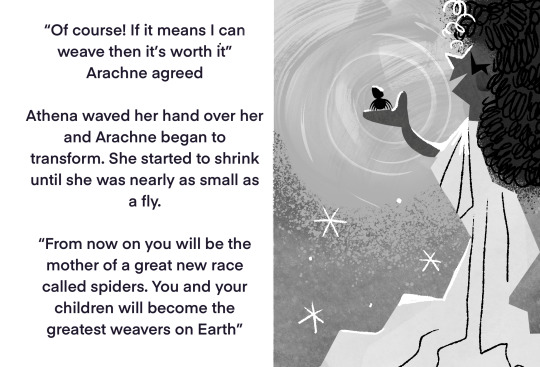

#happy julius ceaser day#julius ceaser#greek mythology#athena#procreate#artist#artists on tumblr#illustration#art#my art#illustrator#colorful art#short story#retelling#the first spider#arachne#kidlit
104 notes
·
View notes
Text

NOW LIVE ON KICKSTARTER: Tales of the Tongue, A Queer Collection of Folklore!
this year's Cozy Library Corner curated anthology features a collection of myths, retellings, folklore, ancient beasts and rituals, some retold, some fresh from the minds of the contributors. This one is going to be a THICC ONE folks so get ready for nearly 500~ pages across several genres. This anthology is intended for adults only! 🚫
Full contributor list below the readmore!
The Tales Of The Tongue Fellowship 🪵 🍄🟫 📖
AA Fairview - Author
adik graves - Author
Alice Scott - Author
Aether Montgomery - Author
Barbie - Staff / Social Media
Carolina Cruz - Author
Claude Hamesh - Author
DC Guevara - Author
Elle Porter - Author, Staff
Felix Graves - Author
H.S. Wolfe - Author, Cover Artist, Curator
Hex McKenna - Author
Ian Haramaki - Author
Jun T.N. - Author & Formatter
Kal Morgan - Author
Kellen Graves - Author
K.M. Enright - Author
Ladz - Author
Lucien Burr - Author
Luna Fiore - Author
Lysander Arden - Author
mars adler - Author, Artist, Curator
Michaelis Moshu - Artist
MJ Marlowe - Author
Morgan Dante - Author
Nelka Mazur - Editor
Olive J Kelley - Author
Sapphire Lazuli - Author
Shane Reid - Author
Sirius - Author
TK Jameson - Author
Tyler Battaglia - Author, Artist, Admin / Staff
Wendy Richmond - Artist
Wren V Lothaire - Author
Yune - Artist
BACK NOW on kickstarter and help us reach some of our stretch goals! HAPPY PRIDE

#queer#queer books#anthology#kickstarter#pride#queer author#queer authors#lgbt books#book kickstarter#anthology kickstarter#indie author#indie authors#cozy library corner#mars adler#h s wolfe#folklore#folk tales#myth retelling#myths#retelling#tales of the tongue#tott anthology#tales of the tongue anthology
82 notes
·
View notes
Text

118 notes
·
View notes
Text
Favorite niche book genre


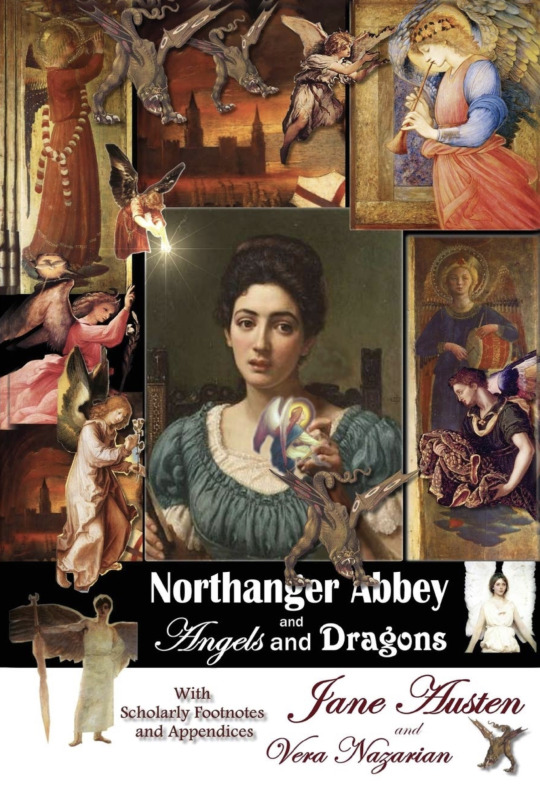
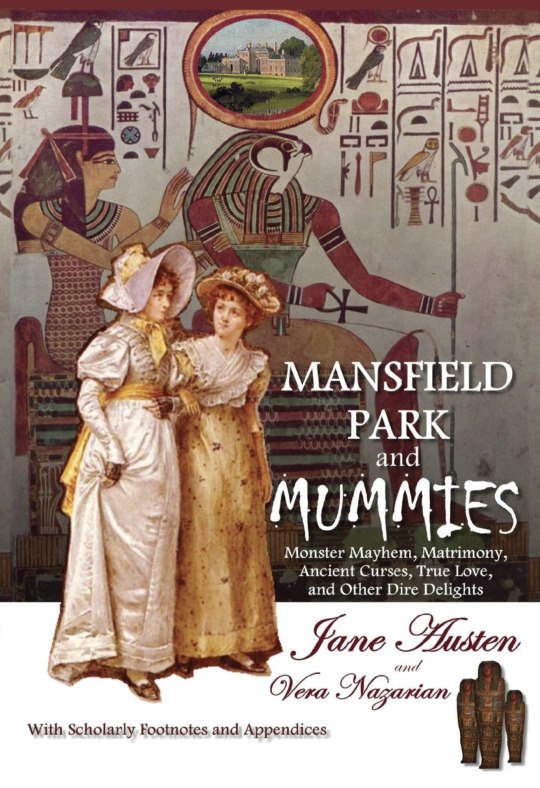
#these 4 are the ones than mainly caught my eye#but there are hundreds of Austen retellings like that#specially mixing p&p and vampires#I saw one where mr Darcy turned into a platypus#one where Elizabeth Bennet and Catherine Morland were cousins and#they found vampires or smth#one set in a post-canon p&p universe where Elizabeth fights aliens?#this is basically fanfiction it’s so fun#idk if they’re any good I haven’t read them yet I want to#jane austen#sense and sensibility#pride and prejudice#northanger abbey#mansfield park#retelling#pride and prejudice and zombies#sense and sensibility and sea monsters#Northanger abbey and angels and dragons#Mansfield Park and mummies
249 notes
·
View notes
Text


guess I do have favorites after all 📚
reblog is ok, don’t repost/use
#my photos#books#bookblr#bookblog#anne carson#louise glück#madeline miller#oscar wilde#booklover#bookworm#bookaholic#bookshelf#favorite books#reading#reading community#poetry books#retelling#fitzcarraldo#light academia#light academia aesthetic#academia#academia aesthetic#studyblr#studyblog
208 notes
·
View notes
Text
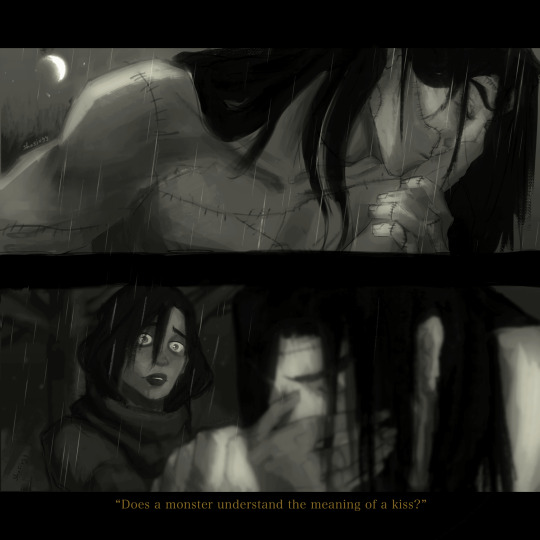
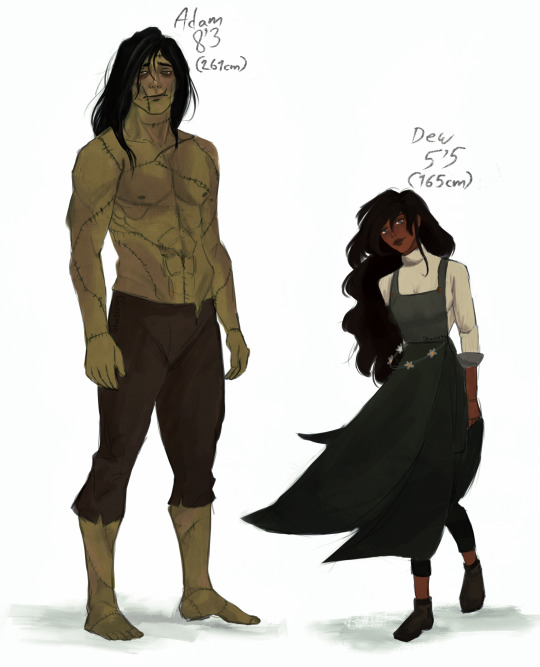
Some of the main characters from my Frankenstein retelling.
{When darkness shines}
Adam. (Victor Frankenstein’s creature)
Dew. (An original character created by me for a big role in the retelling, which includes being the love interest of Adam.)
Victor will be the next to introduce 👀
#artist#art#Retelling#retellings#Frankenstein#victor frankenstein#frankensteins monster#mary shelly's frankenstein#bride of frankenstein#classic#classic story#classical art#original character#original art#digital art#artists#fyp#fanart#fanarts#Frankenstein art#frankenstein's creature#Frankenstein fanart
213 notes
·
View notes
Text

This is the second scene of my wuxia retelling of Shakespeare's Titus Andronicus.
In the source material Titus returns home after years of war, bring with him all the bodies of his fallen soldiers (he refers to them as his, "sons;" some folks have taken this literally, which would mean Titus had somehow fathered hundreds and hundreds of boys in his free time, since the crypt is nearly full after decades at war). With him in chains is the defeated Goth Queen, Tamora, along with her three sons (Demetrius, Chiron and Alarbus), as well as Tamora's lover, Aaron the Moor (and yes, Aaron is a highly problematic character ... which is a polite way of saying racist as fuck). In order to appease the dead, Titus has Alarbus butchered as a sacrifice. We are also introduced to Lavinia, Titus' daughter.
Because this version is wuxia and has most of the genders flipped, instead of slicing and dicing Hēi Dú, General Tiān Mǔ orders her oldest daughter, Tiě Yīng, to shatter Hēi Dú's meridians, leaving her as a living corpse entombed with the glorious dead.
ACT I · SCENE II.
[剑冢森森,魂灯荧荧] [A forest of grave-swords; ghost-lanterns flicker blue.]
[祖剑堂 · 地宫] [Ancestral Sword Hall · Underground Crypt.]
[战鼓渐歇,丧钟低鸣。地宫穹顶垂百剑,剑柄为碑。二十石台空置,待天母众女。青烟如蛇,盘绕尸骨未寒之刃。]
[War drums fade into funeral gongs. A cavern lit by yin-blue lanterns, its walls studded with hundreds of upright swords, each a warrior’s grave-marker. Twenty empty stone plinths await Tiān Mǔ’s fallen soldiers. Incense coils like serpents around blade-cooling flesh.]
[铁链声响。铁链与铁翎押阵,铁山刀卫捧灵位与佩剑次入,后随铁英、铁血。天母戎装未卸,甲上犹带草原尘沙。大狼与其女[灰毒、蓝毒、黑毒]棘链缚身。末入巴悉拉,景教十字暗芒浮动。] [Chains clank. Tiě Lián and Tiě Líng lead the procession, followed by Iron Mountain Blades bearing spirit tablets and sheathed swords. Tiě Yīng and Tiě Xuè enter next, then Tiān Mǔ, her armor still crusted with steppe dirt. Behind them, Dà Láng and her daughters (Huī Dú, Lán Dú and Hēi Dú) shuffle in manacles. Last comes Bǎ Xī Lā, his Nestorian cross glinting like a hidden knife.]
[众人迫大狼一族跪于五眼蟾蜍铜魂炉前。] [The prisoners are forced to kneel before a bronze soul-brazier shaped like a five-eyed toad.]
天母 / TIĀN MǓ.
[举碎玉令,诵咒如刃。] [Raising her broken Jade Seal, chanting like a whetstone on steel.]
"玄女兵主——" "Xuánnǚ, Dark Mother of War—"
"开黄泉之扉。" "Open the Yellow Springs’ gate."
[抚剑墙,声裂金石。] [Her palm scrapes along blade-embedded walls, voice splitting metal and stone.]
天母 / TIĀN MǓ [cont.]
"吾女今与鬼同行。" "My daughters walk with ghosts now."
"以刃镇幽冥。" "Let their swords guard the underworld’s edge."
[铁山刀卫置灵位于石台,朱砂名讳如血。无棺椁,以剑代尸。] [The Iron Mountain Blades place spirit tablets upon the plinths, each name inscribed in cinnabar. No coffins; the dead are honored as ancestral swords, not corpses.]
天母 / TIĀN MǓ [续] [抚空台,甲缝渗沙。] [Her armored fingers brush an empty plinth, steppe-dust sifting from the joints.]
"祖剑冢啊…" "O sacred crypt ..."
"汝���吾欢,亦纳吾悲。" "You who cradle my joy and grief alike."
"为何贪噬无厌?" "Why must you feast so ravenously?"
铁英 / TIĚ YĪNG.
[执刃穿魂幡,幡动如濒死之息。] [A dagger-pierced soul-banner trembles in her grip like a death rattle.]
"母亲,赐一囚破丹田。" "Mother, grant us a prisoner to shatter."
"以炁饲亡魂。" "Let her qi feed the dead."
"化其息为香。" "Let her breath become their incense."
天母 / TIĀN MǓ.
[戟指灰毒,甲上反光如狼瞳。] [Her gauntlet points to Huī Dú, armor-scratches glint like wolf-eyes.]
"取可汗长女。" "Then take the Khagan’s eldest."
"草原狼种,正合燃薪。" "a steppe-wolf’s whelp, fit kindling."
大狼 / DÀ LÁNG.
[锁链暴起,棘刺入肉。] [Chains rattle as manacles bite deeper into flesh.]
"这也配称‘道’?" "You call this Taoism?!"
"分明是屠场!" "This is butchery!"
[唾血] [Spits blood.]
"玉皇必降天罚——" "The Jade Empress will curse your—"
天母 / TIĀN MǓ
[抬手如闸,声寒于铁。] [A raised hand silences like decapitation.]
"天道不悯豺狼。" "The Tao has no mercy for wolves."
"汝女之息,当饲吾殇。" "Your daughter’s breath will feed my dead."
铁英 / TIĚ YĪNG.
[并指为鹤喙,点向灰毒后腰。] [Fingers coiled like a crane’s beak, pressing to Huī Dú’s spine.]
"道予炁,道夺炁。" "The Tao gives qi. The Tao takes it."
[三击如钟。] [Three strikes toll like a funeral bell.]
铁英 / TIĚ YĪNG [cont.]
"命门。" [Mìngmén.]
[闷响,灰毒气息骤滞。] [A dull thud—Huī Dú’s breath seizes.]
铁英 / TIĚ YĪNG [cont.]
"脊中。" [Jǐzhōng.]
[玉裂之声,肌骨僵锁。] [A crack like splitting jade, her body locks rigid.]
铁英 / TIĚ YĪNG [cont.]
"大椎。" [Dàzhùi.] [折骨脆响,银炁自七窍喷涌,旋入魂炉。] [A final snap, silver qi erupts from her pores, swirling into the brazier.]
[炁凝‘仇’字,瞬散。铁山刀卫置灰毒于碑前,形存神灭,永跪为鬼奴。] [The qi forms the character 仇 《vengeance》 before dissolving. Huī Dú’s hollowed body is propped before the plinths; a living ghost forced to kneel eternally.]
天佑 / TIĀN YÒU.
[三叩入殿,额抵冷石。] [Entering with three kowtows, forehead pressed to stone.]
"母亲…" "Mother…"
[捧纸马,声颤。] [Clutching paper effigies, voice trembling.]
天佑 / TIĀN YÒU [cont.]
"儿带冥驹,助姊远行。" "I bring paper horses for their journey."
[天佑一边吟诵诗歌,一边焚烧人像。]
[Tiān Yòu begins burning the effigies while reciting poetry.]
天佑 / TIĀN YÒU [cont.]
"双蛇缠…" [Two snakes entwined ...]
[纸灰突燃碧火。]
[The ashes flare emerald.]
天佑 / TIĀN YÒU [cont.]
"无首尾 ..." [Neither head nor tail ...]
[焚纸,灰烬化鹤形——白思之徽。] [The ashes twist into a crane—Bái Sī’s crest.]
天佑 / TIĀN YÒU [cont.]
"唯饥无宴。" [Only hunger without feast.] [魂炉中五眼骤睁。]
[The toad-brazier’s eyes snap open.]
[天佑退后,诗成谶言。] [Tiān Yòu staggers back, the poem now a curse spoken out loud.]
天母 / TIĀN MǓ.
[捧子面,甲锈沾颊。] [Cupping his face, her gauntlet leaves dried blood like tear-stains.]
"吾儿…" "My son…"
"男儿总被讥弱。" "The world calls boys weak."
"然你乃吾德所铸之身。" "But you are my virtue made flesh."
[低语切齿。] [A whisper like grinding steel.]
天母 / TIĀN MǓ [cont.]
"活得比我久。" "Outlive me."
[按剑柄,刃吟如泣。] [Her palm on a sword-hilt, the blade hums a mourner’s tune.]
天母 / TIĀN MǓ [cont.]
"安息吧,吾刃。" "Rest, my blades."
"未斩之恨,生者必断。" "The living will cut what you could not."
[所有人都退场。]
[Everyone exits.]
[门阖。终余:灰毒游丝之息,与万剑饥鸣。] [The doors seal. Last sounds: Huī Dú’s shallow breath in the dark and the swords’ hungry humming.]
֍
Notes.
Unlike Aaron the Moor, whose presence in the play is never really explained (except for being Tamora's baby daddy) Bǎ Xī Lā (the name he adopted since arriving in China), is in fact European, a Nestorian Christian missionary, with a demonic apatite for destruction (thank you, Guns and Roses). Other terms that need to be explained are:
Tiān Mǔ refers to her soldiers as, Iron Mountain Blades (for no other reason than I thought it sounded interesting). In traditional Chinese medicine, meridians are invisible pathways in the body through which vital energy circulates. This energy is called Qi (气) an energy field ... created by all living things; it surrounds us and penetrates us and binds the galaxy together. If that sounds a bit Star Wars-ish now you know where Lucas stole his idea from, you're welcome. Paper horses (纸马) were burned to transport the souls of the deceased to the afterlife.
The only part that gave me pause was trying to come up with a description of how meridians would be cut or severed, since in the wuxia kung fu movies I've seen someone declares that they're using, "the Quivering Palm" (or something) and a glowing CGI cloud then leaves the body. Personally, I am very fond of the description used in Airplane! (1980):
"It starts with a slight fever and dryness of the throat. When the virus penetrates the red blood cells, the victim becomes dizzy, begins to experience an itchy rash, then the poison goes to work on the central nervous system, severe muscle spasms followed by the inevitable drooling. At this point, the entire digestive system collapses accompanied by uncontrollable flatulence until, finally, the poor bastard is reduced to a quivering wasted piece of jelly."
... but I suppose there are better descriptions out there, somewhere.
32 notes
·
View notes
Text
If you want tension, if you want dark academia, homoeroticisam, fucked up found family, murder, tragedy, passion, and a literary masterpiece whose poetically tumultuous narrative is as brilliant as Shakespeare himself, you have to read If We Were Villains. Do it. Do it now.
#dark academia#book things#books#shakespeare#retelling#if we were villains#the secret history#ml rio#iwwv#homoerotic#gay#book recommendations
54 notes
·
View notes
Text

"The gods do not know love, because they cannot imagine an end to anything they enjoy. Their passions do not burn brightly as a mortal's passions do, because they can have whatever they desire for the rest of eternity. How could they cherish or treasure anything? Nothing to them is more than a passing amusement, and when they have done with it, there will be another. " - Jennifer Saint, Ariadne
#literature#litedit#booklr#ariadne#ariadneedit#jennifer saint#greek mythology#retelling#mythology#mythologyedit#moodboard#theseus#books#books and reading#booksedit#dionysus#phaedra#minos#the minotaur#greek myth retellings#greek gods#ariadne x dionysus#icarus#librarysource#booknet#greek myth aesthetic#fictionnet#fictiondaily#userthing#greekmythologyedit
93 notes
·
View notes
Text
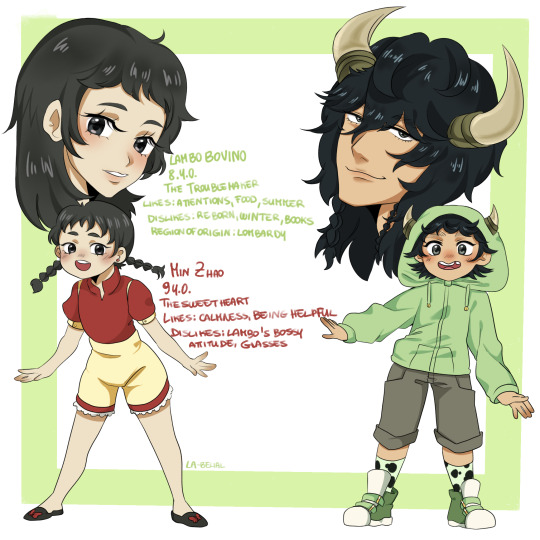
Ipin and Lambo redesign!
I decided to give Ipin a real name and i though Min was really cute
I also made them a bit older because I wanted them to be a bit conscious of what happens around them! I also included the tyl versions because why not?
#khr#katekyo hitman reborn#tutor hitman reborn#non fgo#my art#redesign#retelling#uwu#fanart#lambo bovino#ipin
159 notes
·
View notes